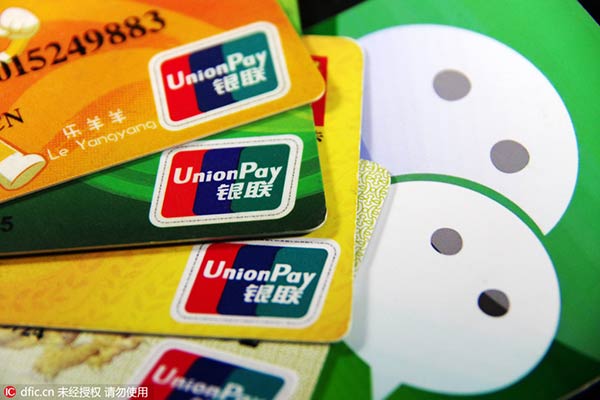Real name required for further use of Alipay and WeChat payment
Updated: 2016-05-25 14:59
By Wu Yan(chinadaily.com.cn)
|
|||||||||
 |
|
Customers who want to continue using payment services via WeChat have to authenticate themselves with real names before July 1. [File photo/IC] |
Customers who want to continue using payment services via Alipay and WeChat have to authenticate themselves with real names before July 1, otherwise the payment services will be unavailable, Chongqing Evening News reported.
Any non-banking online payment institutions have to build a real-name system among their users, according to a regulation issued by the central bank in December last year. The regulation will go into enforcement on July 1.
If a user does not authenticate his/her real name on the platforms as required, he/she will neither be able to transfer, receive and save money, nor pay the bills through the platforms. There will be no exceptions for overseas users.
The popular online payment services Alipay and WeChat are guiding their users to authenticate themselves on their platforms.
As for worries about whether the current money in the accounts would be frozen or disappear if they fail the real-name authentication after July 1, the Alipay has said that the money will still be there and users can use it after they finish the authentication.
The regulation also classifies users into three categories and manages them differently.
Category 1 includes users handling small transfers and payments totaling no more than 1,000 yuan ($152.5) since the account opened; Category 2 includes those handle money transfers and payments totaling no more than 100,000 yuan a year; Category 3 includes those who handle money transfers and payments, as well as purchasing financial products, totaling no more than 200,000 yuan a year.
Alipay said that users need to provide different types of information to the real-name system to help them be classified into three categories. It includes filling in a personal information questionnaire, uploading a photo of their identity card, banding bank card, etc.
The regulation aims to prevent financial risks and safeguard users' payments, said an expert with the finance department of a commercial bank in Southwest China's Chongqing municipality.
Related Stories
Boss uses WeChat trick to catch rule breakers 2016-01-08 07:56
Wechat becomes major platform for Chinese people 2015-06-29 09:03
4 WeChat scammers arrested in East China 2015-05-30 21:20
Woman spends $2,600 on WeChat in three days 2015-05-10 14:36
Military wives warned about risk of secret leakage on WeChat 2015-04-07 06:36
Today's Top News
Refugees relocated during major police operation
China calls for concerted anti-terror efforts
London's financial centre warns of dangers of Brexit
Russia blasts NATO for Cold War mentality
Vietnam, US adopt statement on partnership
Alibaba expands in Belgium amid protectionism
Eiffel Tower to become rental apartment for first time
Wreckage of crashed EgyptAir plane found at sea
Hot Topics
Lunar probe , China growth forecasts, Emission rules get tougher, China seen through 'colored lens', International board,
Editor's Picks

|

|

|

|

|

|







